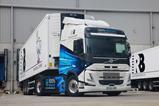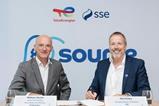Scania it is taking a significant step to decarbonise its supply chain with announcement of mandatory purchasing requirements.

Scania has moved to substantially reduce the carbon emissions of its supply chain with the announcement it aims to achieve 100 percent green purchases of key materials, including steel, batteries, aluminum, and cast iron, for its European operations by 2030. These materials currently represent approximately 80 percent of carbon emissions associated with Scania’s production processes, says the company.
The company defines “green” as the elimination of main emission sources through the adoption of new technologies, green electricity, and/or recycled material. For instance, in battery production, access to green energy is considered crucial, while in flat steel production, the shift from coal to green Hydrogen is emphasised.
In a pioneering move within the industry, Scania is implementing these levers as mandatory purchasing requirements. Negotiations of future contracts and reviews of existing ones will include requirements on technologies mentioned for the delivery of batteries, steel, aluminum, and cast iron for Scania’s European production.
Supplier engagement plays a crucial role in the success of this green transition, and Scania has already made progress in this regard. The company has placed its first order of green steel from h2 Green Steel and has announced a joint target with SSAB to decarbonise all current steel deliveries by 2030. Green steel supplies for Scania’s European production are expected to commence in 2026. In collaboration with Northvolt, Scania has developed a battery cell tailored for heavy-duty transportation, featuring world-class performance and a low Carbon footprint.
Scania President and CEO, Christian Levin indicated that efforts are underway to extend the scope of the Decarbonisation target to cover the entire global supply chain, reflecting Scania’s commitment to fostering sustainability beyond its immediate operations. This strategic move aligns with the company’s dedication to innovation, corporate governance, and sustainable business practices.


















